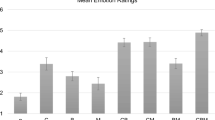Abstract
The influence of specific emotions (fear and anger) on the ultimate attribution error was investigated. Participants were recruited from an undergraduate population. There were 420 participants (156 male) with a mean age of 19.26 years. Participants took part in an online study. The study identified participants’ political in-groups (Democrat or Republican), induced them to feel an emotion (fear, anger, or neutral), and asked them to make an attribution (dispositional or circumstantial control) for the good or bad behaviors of Democratic or Republican politicians. Results revealed an ultimate attribution error (participants made in-group favoring/out-group derogating attributions), and an influence of emotion over the pattern of attributions made within this attribution error. The hypothesis that the valence of emotions influences attributions within the ultimate attribution error was supported. No support was found for the hypothesis that appraisal dimensions of emotions influence attributions within the ultimate attribution error. Theoretical implications and future directions were discussed.
Similar content being viewed by others
References
American Psychological Association. (1992). Ethical principles of psychologists and code of conduct. American Psychologist, 47, 1597–1611.
Baumgardner, A. H., & Arkin, R. M. (1988). Affective state mediates causal attributions for success and failure. Motivation and Emotion, 12, 99–111.
Bower, G. H. (1981). Mood and memory. American Psychologist, 36, 129–148.
Coleman, M. D. (2011). Emotion and the self-serving bias. Current Psychology, 30, 345–354.
Congressional Record (2011). http://www.gpoaccess.gov/crecord/index.html.
Duncan, B. L. (1976). Differential social perception and attribution of intergroup violence: testing the lower limits of stereotyping of Blacks. Journal of Personality and Social Psychology, 34, 590–598.
Finucane, M. L., Alhakami, A., Slovic, P., & Johnson, S. M. (2000). The affect heuristic in judgments of risks and benefits. Journal of Behavioral Decision Making, 13, 1–17.
Forgas, J. P. (1995). Mood and judgment: the affect infusion model (AIM). Psychological Bulletin, 117, 39–66.
Forgas, J. P. (1998). On being happy and mistaken: mood effects on the fundamental attribution error. Journal of Personality and Social Psychology, 75, 318–331.
Forgas, J. P., & Locke, J. (2005). Affective influences on causal inferences: the effects of mood on attributions for positive and negative interpersonal episodes. Cognition and Emotion, 19, 1071–1081.
Heider, F. (1958). The psychology of interpersonal relations. New York: Wiley.
Hewstone, M. (1990). The ‘ultimate attribution error’? A review of the literature on the intergroup causal atrributuion. European Journal of Social Psychology, 30, 311–335.
Hewstone, M., & Ward, C. (1985). Ethnocentrism and causal attribution in Southeast Asia. Journal of Personality and Social Psychology, 48, 614–623.
Horberg, E. J., Oveis, C., & Keltner, D. (2011). Emotions as moral amplifiers: an appraisal tendency approach to the influences of distinct emotions upon moral judgment. Emotion Review, 3, 237–244.
Jones, E. E., & Nisbett, R. E. (1972). The actor and the observer: Divergent perceptions of the causes of behavior. In E. E. Jones, D. E. Kanouse, H. H. Kelley, R. E. Nisbett, S. Valins, & B. Weiner (Eds.), Attribution: Perceiving the causes of behavior (pp. 79–94). Morristown, NJ: General Learning Press.
Keltner, D., Ellsworth, P. C., & Edwards, K. (1993). Beyond simple pessimism: effects of sadness and anger on social perception. Journal of Personality and Social Psychology, 64, 740–752.
Khan, S. S., & Liu, H. (2008). Intergroup attributions and ethnocentrism in the Indian subcontinent: the ultimate attribution error revisited. Journal of Cross-Cultural Psychology, 39, 16–36.
Lerner, J. S., Han, S., & Keltner, D. (2007). Feelings and consumer decision making: extending the appraisal-tendency framework. Journal of Consumer Psychology, 17, 184–187.
Lerner, J. S., & Keltner, D. (2000). Beyond valence: toward a model of emotion-specific influences on judgment and choice. Cognition and Emotion, 14, 473–493.
Lerner, J. S., & Keltner, D. (2001). Fear, anger, and risk. Journal of Personality and Social Psychology, 81, 146–159.
Lerner, J. S., Small, D. A., & Lowenstein, G. (2004). Heart strings and purse strings: carryover effects of emotions on economic decisions. Psychological Science, 15, 337–341.
Levenson, R. (1994). Human emotion: A functional view. In P. Ekman & R. J. Davidson (Eds.), The nature of emotion (pp. 123–126). New York: Oxford University Press.
Oatley, K., & Johnson-Laird, P. N. (1996). The communicative theory of emotions: Empirical tests, mental models, and implications for social interaction. In L. L. Martin & A. Tesser (Eds.), Striving and feeling: Interactions among goals, affect, and self-regulation. Hillsdale, NJ: Erlbaum.
Pettigrew, T. F. (1979). The ultimate attribution error: extending Allport’s cognitive analysis of prejudice. Personality and Social Psychology Bulletin, 5, 461–476.
Rosenberg, S. W., & Wolfsfeld, G. (1977). International conflict and the problem of attribution. Journal of Conflict Resolution, 21, 75–103.
Ross, L. (1977). The intuitive psychologist and his shortcomings: Distortions in the attribution process. In L. Berkowitz (Ed.), Advances in experimental social psychology, 10 (pp. 173–220). San Diego, CA: Academic.
Ross, L., Greene, D., & Huse, P. (1977). The ‘false consensus effect’: an egocentric bias in social perception and attribution processes. Journal of Experimental Social Psychology, 13, 279–301.
Smith, C. A., & Ellsworth, P. C. (1985). Patterns of cognitive appraisal in Emotion. Journal of Personality and Social Psychology, 48, 813–838.
Tajfel, H., & Turner, J. (1979). An integrative theory of inter-group conflict. In W. G. Austin & S. Worchel (Eds.), The social psychology of intergroup relations. Monterey, CA: Brooks/Cole.
Author information
Authors and Affiliations
Corresponding author
Rights and permissions
About this article
Cite this article
Coleman, M.D. Emotion and the Ultimate Attribution Error. Curr Psychol 32, 71–81 (2013). https://doi.org/10.1007/s12144-013-9164-7
Published:
Issue Date:
DOI: https://doi.org/10.1007/s12144-013-9164-7




